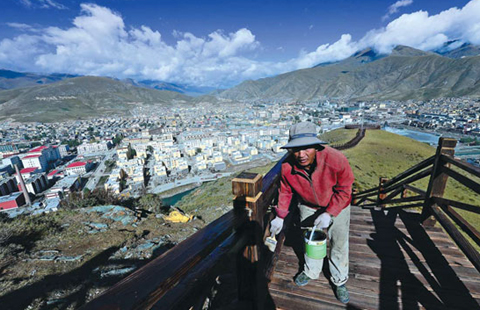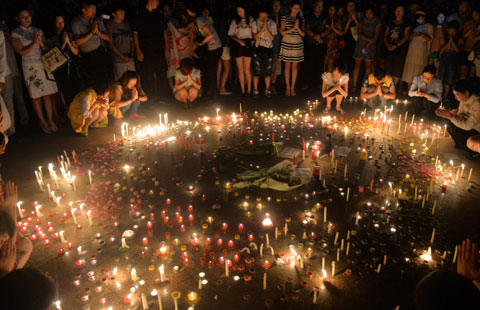Closing the divide
Updated: 2014-08-21 06:51
By Zhang Yan and Wang Qian(China Daily)
|
|||||||||||
Latest reform in household registration system aims to plug rural-urban gaps, report Zhang Yan and Wang Qian in Beijing.
Every day since June, 6-year-old Sun Jiayi has been at the front line of a demonstration in Beijing, demanding to attend primary school in September.
Dozens of children are part of the demonstration. They hold placards with the words "I want to go to school" printed on them. The demonstrators are children of migrant workers who say they have been denied schooling by the local education authorities.
"We have been working in Beijing for 15 years, paying taxes and contributing to the city's development. But my daughter is not allowed to attend school because we do not have Beijing hukou," Chen Ping, a mother of a 6-year-old girl, said in front of the Chaoyang district education commission.
The hukou or household registration system was introduced in 1958. It categorizes the Chinese population into rural and urban groups. Those from rural areas cannot access urban services and facilities including schools, hospitals, housing and eldercare.
Access to education is one of the major issues of concern for the numerous migrant workers who head to urban areas and set up families in the cities, where authorities increasingly realize they cannot ignore the integration of the workers with the resident population.
Faced with increasing criticism of the discrimination under the hukou system, Chinese authorities recently announced plans to gradually give rural migrants full access to services including education, healthcare, housing and social insurance.
Chen and her husband left their small village in Hebei province in 1999 to work in Beijing. Chen works as a trainer for accountants, and her husband is a property salesman in the capital. Their daughter was born in Beijing and grew up in the city but she is still registered as coming from a rural household.
Strict requirements
Beijing municipal authorities allow migrants to send their children to local schools, but they must provide documents, including proof of social security entitlement, work contracts and temporary residence permits.
"My company didn't make social security payments for me so I couldn't get the certificate needed for my daughter to attend school," Chen said. The desperate mother said she cried and knelt at the local education office but no school would accept her daughter.
"I will not give up. I will come here every day until the new semester begins in the fall," Chen said.
Migrant workers' children who cannot attend urban schools are a common problem throughout the country. Other major cities such as Shanghai, Chengdu and Guangzhou also have tens of thousands of children with no access to education.
In the past two months, hundreds of migrant parents and children in Beijing have been protesting against the treatment in front of the Chaoyang education commission. About 60 parents have filed lawsuits against the commission, but the courts rejected them.
Other parents have submitted petitions to the Ministry of Education, Beijing Municipal Government and the State Bureau for Letters and Calls seeking redress.
"Local police and authorities have told us to stop our activities and threatened to move us out of Beijing if we continue to do so," said Cheng Xuejiao, one of the petitioners from Fujian province whose six-year-old son cannot attend primary school this September because the family cannot provide an applicable residence permit.
Cheng and her husband have been managing a building materials company in Fengtai district in Beijing since 2007. They have almost no family members left in Fujian province.
Cheng Xuejiao said her son will have to attend school in Fujian, where he is registered under the hukou system, if he cannot do so in Beijing.
"I want to go to school and stay with my parents in Beijing," said her son Dongdong. He was born and raised in Beijing and cannot understand the Fujian accent.
"If my son has to return to Fujian for school, I will have to separate from my husband and start a new life in Fujian. That is impossible," Cheng said.
Sun Qijun from the Chaoyang district education commission said the authorities have issued certificates for attending schools in Beijing to migrants' children with complete documentation and are "persuading a large number of 'unqualified' migrant children to return to their registered locations to attend school".
Accelerated reform
Under guidelines released by the State Council, the country plans to help about 100 million people settle in towns and cities by 2020. It will remove limits in townships and small cities, relax restrictions in medium-sized cities and roll out measures for big cities to accommodate the large flow of rural residents.
The move could put an end to a system that has divided people into urban and rural households since the 1950s, said Huang Ming, vice-minister of public security. In its place, a system of residence permits will be established to allow qualified migrant workers to enjoy urban services.
"The move will accelerate the country's urbanization and contribute to its pursuit of social fairness," said Wu Xianjiang, a professor from People's Public Security University of China who researches household registration reform and population issues.
"By creating favorable conditions, more rural residents will be attracted to urban cities, which will generate a dynamic driving force for the world's second-largest economy," he said.
Under the new guidelines, basic public services, including education, medical care, housing, pension, social insurance, employment and housing, will be expanded to migrant workers and their children.
"It will bring massive opportunities and other reforms to speed up urbanization," said Zhang Yi, a population expert from the Chinese Academy of Social Sciences.
The reform will require large financial support from the government for schools, hospitals, eldercare and housing, he said.
"Apart from increasing central and local government fiscal expenditure, enterprises and individuals should also assume help bear the costs."
According to the Ministry of Public Security, about 52.6 percent of the population in China now lives in cities. But the proportion falls to 35.3 percent if the calculation is based on people's household registration.
Caught between the differences are an army of more than 200 million migrant workers, who have no urban social security entitlement and no access to public housing. Their children also have to pay extra fees to attend public schools.
The hukou system has long caused resentment among China's vast migrant population, currently estimated at 245 million, whose workers are major contributors to the development of cities.
As Premier Li Keqiang emphasized several times, the government will build various systems to speed up the country's urbanization.
"China will take a series of steps to remove limitations on household registration in towns and small cities and gradually loosen the restrictions in large cities to speed up the urbanization," he said in a previous State Council executive meeting, adding that it will allow migrant workers to enjoy equal social welfare with urban residents.
Remaining concerns
Although the latest hukou reform has brought new hope for migrant workers in the cities, some rural workers still raised their concerns.
"The most pressing issue is that of land - if we move to the big cities to work, I wonder whether the local government will confiscate our land, which we mainly depend on to make a living in rural areas," said Zhang Junyi, a migrant worker who has been working on construction sites in Beijing for eight years.
Many rural workers who did not receive higher education and do not possess practical skills also constantly worry about stable employment and integrating in the cities as urban residents, he said.
"Although more migrant works will settle down in big cities to make a living, local governments cannot force them to hand in their farmland and housing in the countryside; and if so, the government should negotiate with them and offer them some economic compensation," said Wu, the professor.
"The key of hukou reform is to cancel the differences seen in urban and rural residents' household registrations, and enable them to enjoy the same social welfare in cities, rather than force rural people to give up their land and housing to exchange for public resources in cities," he said.
"Progress has been made and further reforms will be pushed forward in a gradual manner," said Guo Weimin, spokesman for the State Council Information Office.
Liu Limin, vice-minister of education, said that in the past three years, more than 3 million migrant children have entered kindergartens in cities, and 28 provinces and regions are unveiling or discussing policies on offering migrant students access to the college entrance examination.
Similarly, Wang Pei'an, vice-minister of the National Health and Family Planning Commission, said a community-based healthcare system has been established in cities with 8,488 community medical care centers built across the country by the end of 2013.
Huang Ming, vice-minister of public security, said the hukou reform will be unprecedented in scale, coverage and measures to reflect the resolution of the central government in addressing the concerns of the people.
Contact the writers at zhangyan1@chinadaily.com.cn and wangqian@chinadaily.com.cn
(China Daily 08/21/2014 page6)
Today's Top News
Telegram good gesture from Pope to China
Japanese firms face $200m fine
Ice Bucket Challenge hits China
Gaza ceasefire talks collapsed
Heinz recalls four batches of infant food in China
WHO says Ebola has killed more than 1,200
Japan looking to buy more stealth fighters
2 Air Force jets collide in Italy, 4 airmen missing
Hot Topics
Lunar probe , China growth forecasts, Emission rules get tougher, China seen through 'colored lens', International board,
Editor's Picks

|

|

|

|

|

|





